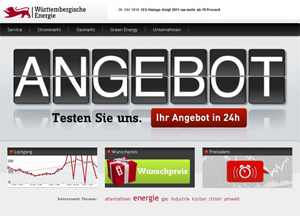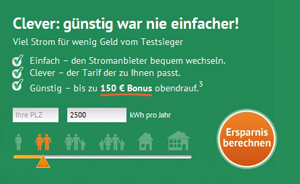Free to choose, can German consumers remake their energy sector from below?
on
Free to choose, can German consumers remake their energy sector from below?
Although Germany's energy sector has been liberalized for over a decade, German consumers have been slow to embrace the opportunities of the free market, certainly compared to countries like the UK and Ireland. The main reason is that they are fearful of being cheated and uncertain about the advantages. Still, the German energy market is changing slowly but surely. New green (and nuclear-free) energy providers are making inroads, the big incumbent suppliers are offering new products and, most surprising of all, the old Stadtwerke are being bought back by municipalities and eagerly competing in the market. The government in Berlin meanwhile has adopted new laws designed to make switching a piece of cake, which could give another boost to the free energy market in Germany. Paul Hockenos reports from Berlin.
 |
| All pictures in this article: German advertisements on electricity price comparison |
Vladimir Lenin said that German revolutionaries would line up and buy a ticket before storming a train station. Perhaps the same goes for switching energy providers.
Compared to Europe's leader in the field, Great Britain, or even a newcomer to deregulation like Ireland, Germany lags woefully behind. 28 percent of Germans have changed their electricity supplier since 1998, when the market was opened, and 18 percent have found new gas companies. In the UK as of 2012, 61 percent of domestic electricity and 58 percent of gas customers had transferred from their home supplier, according to the Department of Energy and Climate Change. In Ireland, 40 percent have switched since 2009, when it first became possible for Irish households to choose providers. In the Netherlands at the close of 2011, the figure stood at 35 percent.
Since the implementation of EU directives to open up competition in 1998, Germany's energy market has changed dramatically, in part a result of consumer demand. At that time, there were about 950 electric power companies in Germany, which all had their own supply areas. Presently, there exist 1,100 electricity suppliers as well as more than 800 gas suppliers in Germany. According to the German Association of Energy and Water Industries (BDEW), domestic customers can choose on average among 102 electricity suppliers and 37 gas companies. Germany's share of renewable energy in the electricity sector jumped from under six percent in the 1990s to over 20 percent today, one of the highest in Europe. Ten percent of German households have switched to renewable energy providers, a figure that outstrips the likes of UK and Ireland hands down, market experts say.
"The liberalization of the German energy market is a story of success", says Hildegard Müller, Chairwoman of the General Executive Management Board of the BDEW. "For the energy sector at that time, liberalization was almost a revolution. But today, competition in the German energy market is a matter of course."
Yet there are many who are unsatisfied with what they see as the plodding pace of competition and diversification in the German market. Even though Germany has a larger number of suppliers than most
| "For the energy sector at that time, liberalization was almost a revolution. But today, competition in the German energy market is a matter of course" |
Sharp jumps
The Germans who have left their home utility company for another supplier have done so for two primary reasons: better prices and/or greener products. Of the 28 percent that have switched suppliers, over a third have gone to providers of renewable energies (mostly, but not exclusively, Greenpeace Energy, Lichtblick, Naturstrom, Elektrizitätswerke Schönau). The rest have switched mostly for reasons of price. The pace of this shift has been mostly gradual - roughly 4-5 percent a year.
The exception to this has been sharp jumps in the rate of switching, particularly to green energy providers, in reaction to nuclear plant accidents. In response to the Fukushima disaster last year, as in the aftermath of the 2009 accident at the Krümmel reactor near Hamburg, there was a rash of defections from gas and electric companies with nuclear holdings. "The providers with nuclear in their portfolios were punished", says Sascha Müller-Kraenner, European representative of the Washington-based Nature Conservancy, one of the world's biggest environmental organizations.
 |
The effects of Fukushima did not last long. After peaking sharply in the months following the disaster, the switching rate returned roughly to its former average.
Consumption graphic
The reluctance of German consumers to take advantage of new options in the energy market has miffed both environmentalists and free-market liberals, two factions not usually on the same page when it comes to German energy policies. Environmental groups want more Germans to switch to clean energy for ecological reasons, to facilitate the transformation to a low-carbon economy. The government also hopes that intensifying competition will bring prices down for consumers and businesses, thus stimulating economic growth.
For this reason, in April 2012, the Federal Ministry of Economic Planning introduced a new flurry of measures that are meant to open the gas and electricity markets even further. In essence, they should make the process of choosing a new supplier even easier, more transparent, and faster.
The first of these laws is a shortened notice period for canceling a contract with a given supplier. Early in the 2000s, when the first customers began to exercise their right to change companies, the process could take months. The new legislation stipulates that the cancellation notice period is two weeks for basic tariffs (Grundversorgung) and the entire process of switching should take no longer than three weeks. Moreover, consumers no longer have to wait until the first of the month to give notice. They can do it on any working day.
Other measures are designed to give consumers a better picture of their energy use and thus more information with which to make a choice. For example, gas and electricity suppliers are now required to provide customers with bills that clearly show how much energy they used and the contact information of a person to whom they can address should they have a question or find a mistake in the bill.
 |
In addition, as of late last year, a new arbitration board for energy issues, the Schlichtungsstelle Energie, was created jointly by the Ministry of Economic Planning, the Federal Ministry for Consumer Affairs, and the BDEW. The purpose of the independent board is to reduce and expedite disagreements between energy suppliers and customers, on the one hand, and to create higher standards for service in the market as a whole, on the other. Toward the latter aim, companies that adhere to the board's rulings will be able to advertise with a "certificate of confidence".
"The upshot of all of these measures taken together is that consumers will have more information with which to make an informed choice", explains Peter Kafke of the Verbraucherzentrale Energieberatung, a government-subsidized energy consultancy. "People should get a much better sense of how much they are spending for energy and how they can do better. With the possibility to compare between months or quarters, for example, it makes consumers more aware of what consumption costs them and when. This is pretty much the final leg in simplifying the process that enables people to leave one supplier and sign up with another. Now it’s a standard procedure."
But not everybody agrees the changes are for the better. The Association of Municipal Companies (VKU), which represents 900 local utility companies, criticized the measures as unnecessarily costly and complicated, particularly for the smaller kind of local companies it represents.
Being cheated
So will these new measures actually translate into more customers changing energy suppliers and thus an expedited transformation of the energy market itself? And if so, in what direction?
Broad-based public campaigns by the comparison portals, the Verbraucherzentrale Energieberatung, non-incumbent energy providers, and others claim that most individuals could save as much as 200 euros a year on their bills by switching; a family of four could save about 300 euros. It's simple, says Aribert Peters of the Association of Energy Consumers: "Too few consumers are taking advantage of this option."
According to a recent survey conducted for the German internet portal Strom Auskunft by the consulting firm Putz & Partner, 58 percent of Germans could imagine switching from their current energy providers. One in five would "consider" a green-power alternative. A 2011 all-EU survey showed that only the British and the Irish consumers find it easier to switch than do Germans. So, why don't they do it?
Studies show that the main reason for Germans not to switch providers, even though they could save money, is fear. "For years the big utilities waged campaigns explicitly designed to instill this fear. They implied that you could wind up with no power at all if you tried to switch," explains Greenpeace Germany's Sven Teske in Berlin. "Thus many people have trouble trusting a new company. What they know and what has been reliable is better than what's cheaper."
Another issue for consumers is navigating the jungle of suppliers and offers. According to the Strom
| "It's often the case with these rogue suppliers that there's lots of fine print and special deals that aren't really deals at all when you read the very fine print" |
"It's often the case with these rogue suppliers that there's lots of fine print and special deals that aren't really deals at all when you read the very fine print", explains Melanie Ball of the Berlin-based NGO ausstieg-selber-machen, which promotes renewable energy alternatives to nuclear.
The price comparison sites, like Verivox, Stromtipp, Strom Auskunft, and others, are yet another issue. German consumer advocate groups, like Stiftung Waren Test and Ökotest, distinguish between sites that are more and less trustworthy. Today, all of the sites use the entire market in their comparisons and generate income through provisions from suppliers. Yet, "they don't distinguish between the discounters and more serious companies", says Ball of austieg-selber-machen.
According to Teske of Greenpeace, even the better sites don't distinguish between the quality of the products offered by green power suppliers. "If the suppliers have some sort of certificate, even if they created it themselves, then the comparison sites call them green", he explains. "Unfortunately there is no single Germany-wide or EU-wide standard."
Rekommunalisierung
 |
"I'm not expecting these measures alone to spur a fundamental change in the current rate of switching providers", says Teske of Greenpeace.
"What will change the equation", says Green MP Hans-Josef Fell, "and at the same time boost the Energiewende is the further fall in prices of renewables. More people will switch when they're cheaper than the alternatives. But this government, and Mr. Rösler's ministry in particular [i.e. the Ministry of Economic Planning], have been blocking this process."
One of the chief arguments for liberalization has been the promise of lower prices for the consumer. Yet prices have risen, not dropped. "This is a result of new taxes, the ecological tariff, and the fact that suppliers' profits have also increased significantly", explains Kafke of the Verbraucherzentrale Energieberatung. "You have to ask: What would the prices today look like had there not been liberalization?"
Something green-minded advocates don't often admit is that consumer pressure has significantly changed the offerings of the Big Four. Vattenfall's Natur Privatstrom package, for example, is one of its offers that provides carbon-free electricity from hydro-power plants in Norway. Eon's Ökostrom package is also renewable energy, while its Bio Erdgas 10+ package includes at least 10 percent of gas produced from biomass.
A surprising development is that Germany's local public utilities, the Stadtwerke, are still standing - and even thriving - a development few foresaw at the onset of liberalization. In the late 1990s, towns and
| "This is an oligopoly. There has to be a far greater decentralizing of the energy market that will benefit smaller producers" |
In fact, so intense has been the Stadtwerke's drive to capture a bigger piece of the production market, that they are among the most intense critics of the market liberalization's skewed supply-side picture. "How can you call a market de-monopolized when four companies own 75 percent of the market?" says Hans-Joachim Reck, director of the Association of Municipal Companies, which represents the Stadtwerke. "This is an oligopoly. There has to be a far greater decentralizing of the energy market that will benefit smaller producers", he says.
This, Reck says, is a matter of state energy and competition policy and not something consumer demand alone can change from below. Greenpeace's Teske agrees: "We need both sides of the equation, the supply and the demand side to make it the energy transition work. We need to beef up renewable energy capacity, which means maintaining the feed-in tariff for many years to come, and also to expand the green power market as much as possible."


Discussion (0 comments)